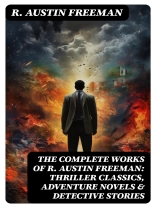In ‚The Complete Works of R. Austin Freeman: Thriller Classics, Adventure Novels & Detective Stories, ‚ readers are invited into the intricacies of early 20th-century mystery fiction through a meticulously curated collection that showcases Freeman’s pioneering contributions to the detective genre. Known for his innovative use of forensic science and a distinctive narrative style that combines meticulous detail with engaging storytelling, Freeman’s works reflect the anxieties and complexities of his time, exploring themes of justice, morality, and human psychology. With a focus on his iconic character Dr. John Thorndyke, this anthology captures the essence of rational inquiry and scientific deduction in solving crimes, serving both as entertainment and a commentary on the societal issues of the era. R. Austin Freeman, a British author born in 1862, forged a unique path in literature, blending his medical background with his literary aspirations. His experiences in the medical field deeply influenced his depiction of detectives, as seen in Thorndyke’s reliance on empirical evidence. Freeman’s works emerged during a period of burgeoning interest in science and rationalism, aligning with the evolving landscape of detective fiction in Victorian and Edwardian England, thus providing a critical link between classic and modern mystery literature. I highly recommend this comprehensive collection to enthusiasts of detective fiction and scholars alike. Freeman’s stories not only entertain but also illuminate the formative years of the genre, making it essential reading for anyone interested in the evolution of literary thrillers. Each tale stands as a testament to his skill and creativity, ensuring that readers will be both captivated and intellectually stimulated.
Über den Autor
Richard Austin Freeman, born on 11th April 1862 in Soho, London, and educated at Middlesex Hospital before embarking on his colonial expeditions as a surgeon, ultimately channeled his insights into a writing career that would define him as one of the fathers of the detective story genre. His contribution to forensic mystery and pre-CSI intrigue positioned him among the titans of early 20th-century crime fiction. Best known for creating the medico-legal forensic investigator Dr. Thorndyke, a character prodigiously featured in numerous novels and short stories, Freeman transformed detective narratives with precise scientific investigations. ‚The Complete Works of R. Austin Freeman: Thriller Classics, Adventure Novels & Detective Stories‘ not only brings together his prolific body of work but also showcases his mastery of plot and the meticulous attention to procedural detail, a literary style that later authors within the genre have sought to emulate. Freeman’s Thorndyke stories, often structured around the concept of the ‚inverted detective story‘, allowed readers to assess the clues alongside the protagonist, engendering an interactive experience that was innovative for its time. The author’s impressive array of works continued to gain popularity for their intellectual rigor and the elegance of his prose, cornerstones that have solidified his enduring legacy in crime literature. He continued to write up until his death on 28th September 1943, contributing enduring favorites to the detective story canon.












